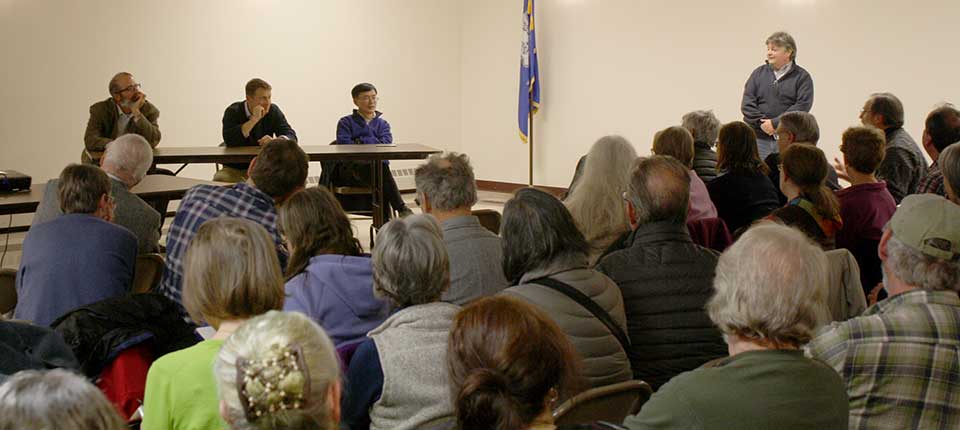More than 60 residents from towns adjacent to the Yale-Myers Forest last week attended a “climate forum” that featured three Yale faculty members who study climate change and the associated impacts on land, air, and water resources.
During the panel talk, held in Union, Conn., attendees heard presentations from
Mark Bradford, a professor of soils and ecosystem ecology at the Yale School of Forestry & Environmental Studies (F&ES),
Xuhui Lee, Sara Shallenberger Brown Professor of Meteorology at F&ES, and
Peter Raymond, a professor of ecosystem ecology at F&ES.
The event was organized by the
Quiet Corner Initiative (QCI), which links F&ES students and faculty with local landowners to improve forestry practices and promote sustainable land management. The initiative works out of the 7,840-acre Yale-Myers Forest, located in northeastern Connecticut.
Building on the QCI’s successful summer seminar series, the climate event was the first winter seminar.
During the event, the Yale researchers guided the attendees through the modeling, influences, and impacts of a changing climate. Raymond traced the history of research on the anthropogenic impacts of climate change, connecting readings of ancient conditions found at the Vostok ice core record in East Antarctica to the modern atmospheric observations collected at the Mauna Loa Observatory in Hawaii. Taking the audience from a global to a local scale, Lee explained the intricacies of climate modeling and the current effects of heat islands on urban residents. Narrowing in even further, Bradford outlined the impacts of a warming climate on insects and an often-overlooked resource, soil.
Audience members inquired about the policies of the current administration and global efforts to reduce carbon concentrations in the atmosphere, expressing anxiety over whether the necessary emissions reduction targets could be reached. Local impacts were also a concern as residents asked questions about the future of soil productivity and agriculture.
QCI leaders hope the gathering will be the first of many that contribute to an ongoing discussion about climate change in the region.
Created in 2010, QCI seeks to engage the communities around Yale-Myers Forest — including Ashford, Eastford, Union, and Woodstock— to foster an exchange of ideas on the stewardship of natural resources and the health of rural economies.
